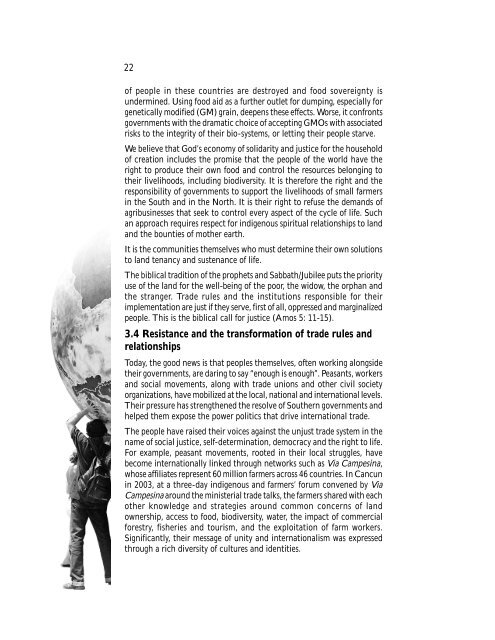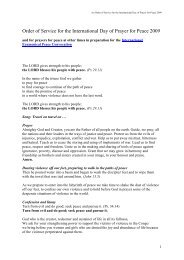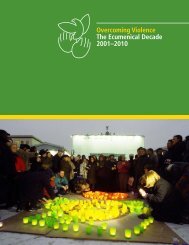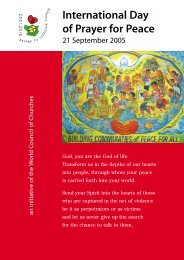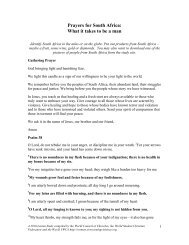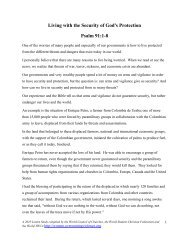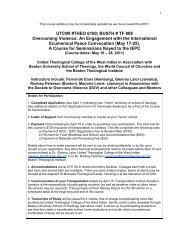Alternative Globalization Addressing Peoples and Earth
Alternative Globalization Addressing Peoples and Earth
Alternative Globalization Addressing Peoples and Earth
Create successful ePaper yourself
Turn your PDF publications into a flip-book with our unique Google optimized e-Paper software.
22<br />
of people in these countries are destroyed <strong>and</strong> food sovereignty is<br />
undermined. Using food aid as a further outlet for dumping, especially for<br />
genetically modified (GM) grain, deepens these effects. Worse, it confronts<br />
governments with the dramatic choice of accepting GMOs with associated<br />
risks to the integrity of their bio-systems, or letting their people starve.<br />
We believe that God’s economy of solidarity <strong>and</strong> justice for the household<br />
of creation includes the promise that the people of the world have the<br />
right to produce their own food <strong>and</strong> control the resources belonging to<br />
their livelihoods, including biodiversity. It is therefore the right <strong>and</strong> the<br />
responsibility of governments to support the livelihoods of small farmers<br />
in the South <strong>and</strong> in the North. It is their right to refuse the dem<strong>and</strong>s of<br />
agribusinesses that seek to control every aspect of the cycle of life. Such<br />
an approach requires respect for indigenous spiritual relationships to l<strong>and</strong><br />
<strong>and</strong> the bounties of mother earth.<br />
It is the communities themselves who must determine their own solutions<br />
to l<strong>and</strong> tenancy <strong>and</strong> sustenance of life.<br />
The biblical tradition of the prophets <strong>and</strong> Sabbath/Jubilee puts the priority<br />
use of the l<strong>and</strong> for the well-being of the poor, the widow, the orphan <strong>and</strong><br />
the stranger. Trade rules <strong>and</strong> the institutions responsible for their<br />
implementation are just if they serve, first of all, oppressed <strong>and</strong> marginalized<br />
people. This is the biblical call for justice (Amos 5: 11-15).<br />
3.4 Resistance <strong>and</strong> the transformation of trade rules <strong>and</strong><br />
relationships<br />
Today, the good news is that peoples themselves, often working alongside<br />
their governments, are daring to say “enough is enough”. Peasants, workers<br />
<strong>and</strong> social movements, along with trade unions <strong>and</strong> other civil society<br />
organizations, have mobilized at the local, national <strong>and</strong> international levels.<br />
Their pressure has strengthened the resolve of Southern governments <strong>and</strong><br />
helped them expose the power politics that drive international trade.<br />
The people have raised their voices against the unjust trade system in the<br />
name of social justice, self-determination, democracy <strong>and</strong> the right to life.<br />
For example, peasant movements, rooted in their local struggles, have<br />
become internationally linked through networks such as Via Campesina,<br />
whose affiliates represent 60 million farmers across 46 countries. In Cancun<br />
in 2003, at a three-day indigenous <strong>and</strong> farmers’ forum convened by Via<br />
Campesina around the ministerial trade talks, the farmers shared with each<br />
other knowledge <strong>and</strong> strategies around common concerns of l<strong>and</strong><br />
ownership, access to food, biodiversity, water, the impact of commercial<br />
forestry, fisheries <strong>and</strong> tourism, <strong>and</strong> the exploitation of farm workers.<br />
Significantly, their message of unity <strong>and</strong> internationalism was expressed<br />
through a rich diversity of cultures <strong>and</strong> identities.


